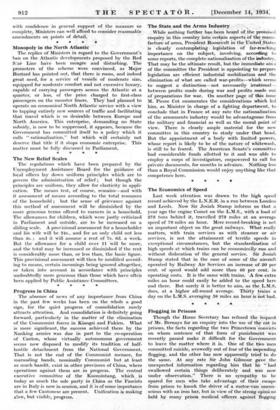The Economics of Speed Last week attention was drawn to
the high speed record achieved by the L.N.E.R. in a run between London and Leeds. Now Sir Josiah Stamp informs us - that a year-ago the engine Comet on the L.M.S., with a load of 273 tons behind it, -travelled 273 miles at an : average speed of 79 miles an hour. Mere record-breaking is not "an important object on the great railways. What- really matters, with train services as with steamer or -air services, is not the attainment of terrific speeds in exceptional circumstances, but the standardization of high speeds at which trains can be economically' run and without dislocation of the general service. Sir Josiah Stamp stated that in the case of some of lhe • aircraft operated by Railway Air Services an increase of .20 per cent. of speed would add more than-40 per cent: in operating costs. It is the same with trains: few. extra miles an hour could easily be added to the speed here and there. But surely it is better to aim, as the L.M.S. does, at a higher all-round average. Thirty trains day on the L.M.S. averaging 58: miles an hour is not bad.
*_







































 Previous page
Previous page